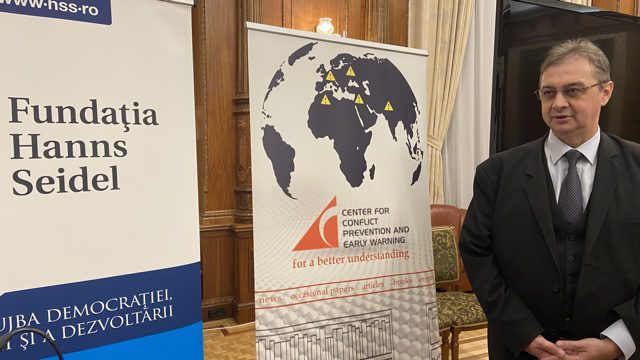During the 20th anniversary of activity of the Center for Conflict Prevention and Early Warning, Iulian Chifu, State Counselor for Foreign Policy, Security and Strategic Affairs of the Prime Minister of Romania, Nicolae Ciuca, conveyed that „this center created a distinct note in the landscape of Romanian think-tanks.”
The event takes place at the Parliament Palace. Below is the full statement of Iulian Chifu:
„The Center for Conflict Prevention and Early Warning, Early Warning as we call it, because the concept comes from the Anglo-American area and we kept it as such, formally turned 20 years old in May. Of course, now we are celebrating the 20 years since the establishment of this center, which I believe has created a distinct note in the landscape of Romanian think-tanks and of everything that means the image of Romania, of the civil society area and yes, through the results, through the publications that he produced has a very difficult word to say in foreign policy, security, defense, especially in these areas.
In fact, it is no coincidence that in the position of director I was a presidential adviser for 4 years and here, now, also a position of president of this center has brought me to the position of being state adviser to the prime minister for foreign policy, security and business strategic. Of course, the center was taken over by those who serve today, the director of the center, Narcis Bălășoiu, the new president of the center, who is Laura Pariț. It is only natural that they come to join us and new generations take over, especially while some of us hold public office. Because that’s another feature of the center. People inside the center go to the public space, perform public functions, then return to the think-tank. It’s a dynamic I’ve learned and seen especially in the US.
The same thing happened to Narcis Bălășoiu when he was an adviser to the Minister of Defense, an adviser to the Deputy Prime Minister for European Integration and to the Minister of Justice for a period of time. So we also have other colleagues who have performed certain functions in the administration in parallel with the current situation, that of researchers of the center, because research, like higher education, is compatible with public office and from this point of view all those who they are involved in the center, they are PhD students, they are all published, they all have a solid theoretical base and this is what brings added value to this center.”


